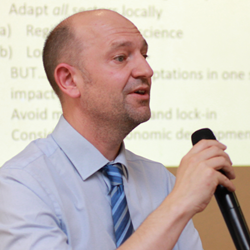Academic leads and research themes
Commonwealth Futures Climate Research Cohort 2023/24

Commonwealth Futures Climate Research Cohort 2023/24






The 2023/24 Commonwealth Futures Climate Research Cohort will focus on five key themes, each supported by an academic theme lead:
1. Water security in a changing world
Nearly 80% of the global population is exposed to high levels of water security challenges, with climate change intensifying the water cycle, altering rainfall patterns, and consequently bringing more frequent and amplified hazards to human societies in many regions. This theme will therefore bring together researchers interested in ‘water security’, referring to sustainable access to sufficient quantity and satisfactory quality of water for livelihood and human wellbeing, for ecosystems, and for protecting against water-related disasters (UN-Water). Sub-themes include (1) Inequality of water security; (2) Water for ecosystems; (3) Water-related hazards.
2. Climate law at national level
Climate governance at national level is key to the delivery of a state’s nationally determined contributions to climate change adaptation and mitigation. While target-setting and accountability process happen through multilateral structures, international commitments will be actualised through individual states’ governance architecture. This requires a legal response, and most countries have now enacted some kind of climate legislation. However, these legal commitments need to be upheld, monitored and understood through legal and political institutions. This theme will focus on bringing together researchers interested in climate law at the national level, supporting country-specific investigations of how domestic climate governance – through law and institutional management – can support the achievement of climate mitigation and adaptation goals.
3. Urban adaptation and resilience
Urban resilience responses are emerging around the world that build the capacity of individuals, communities, institutions, businesses, and systems within a city to survive, adapt, and grow in the face of chronic stresses and acute shocks. This theme will bring together interdisciplinary researchers interested in urban resilience responses and their contribution to climate justice through action research approaches that study change processes. Sub-themes include: Social justice; policy and behavioural change; incentives for climate action.
4. Adapting to flooding and coastal change
Sea-level rise and intensifying coastal storms as a result of climate change are understood to be exacerbating issues such as flooding and coastal erosion (EC). This research theme will bring together researchers interested in adapting to flooding and/or coastal change and will take a systems thinking approach to the essential stages of successful adaptation strategies, utilising interdisciplinarity to investigate the four sub-themes of the science-policy-implementation-evaluation nexus: (1) Climate change risk assessment; (2) The science to policy and planning process; (3) Implementing adaptation interventions; (4) Monitoring and evaluation (M&E) of climate change adaptation actions.
5. Digital governance and marginalised communities
Digital governance is seen to have the potential to catalyse collaboration and improve equity within decision-making processes (Meijer et al. 2020). Yet digital governance is also a challenge for equity, potentially exacerbating established challenges of power, control and representativeness, while inviting new questions around the biases that can be built into digital infrastructure. Digital governance therefore is a challenge as well as an opportunity for climate change adaptation. As such, this theme will bring together researchers who are interested in investigating equity within climate change adaptation governance and decision-making processes, with a particular focus on how emerging digital infrastructure interacts with marginalised communities. Sub-themes include knowledge-power relations, recognition justice, marginalisation and political capability.